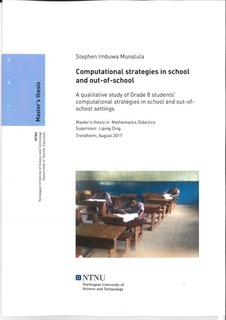| dc.description.abstract | Students' poor performance in national examination remains a major concern worldwide and Zambia in particular. Teachers, students, parents, curriculum developers and the public have tended to blame one another for the poor performance in Mathematics in schools at all levels. In an attempt to respond to this problem, the Zambian Mathematics scholars have carried out many studies in Mathematics education. Despite these studies, students' performance has continued to remain poor. This means that the main reason for this poor performance has not been established yet. The reason could probably be the gap between mathematics learning and practices in school and out of school as described in some studies. The gap could be narrowed by incorporating some of the out-of-school practices into the daily classroom practices so that they can build on and complement each other. In this way, students can bear their mathematical knowledge gained in out-of-school experiences on their school mathematics. Likewise, students can use their school mathematics in solving problems that occur in everyday situations. The aim of the study was to find out what computational strategies Grade 8 students use in school and out-of-school settings and also to compare the strategies in both settings in Mongu District.
The study employed a qualitative research and focused on four Grade 8 students who were followed up in school and out-of-school. Data collection methods in this study included observations, semi-structured interviews and testing. The findings revealed that students’ use of semantically-based mental computational strategies was more predominant in out-ofschool settings than in school settings whereas written school-like computational strategies were used more frequently. The students’ use memorised mathematics facts was common to both settings.
Based on the findings, the study recommended that teachers should bridge the gap between school mathematics and everyday mathematics such that students can bear their mathematical knowledge gained in out-of-school experiences on their school mathematics. Likewise, students can use their school mathematics in solving problems that occur in everyday situations. In this way, the performance of pupils in mathematics will be improved. | nb_NO |
